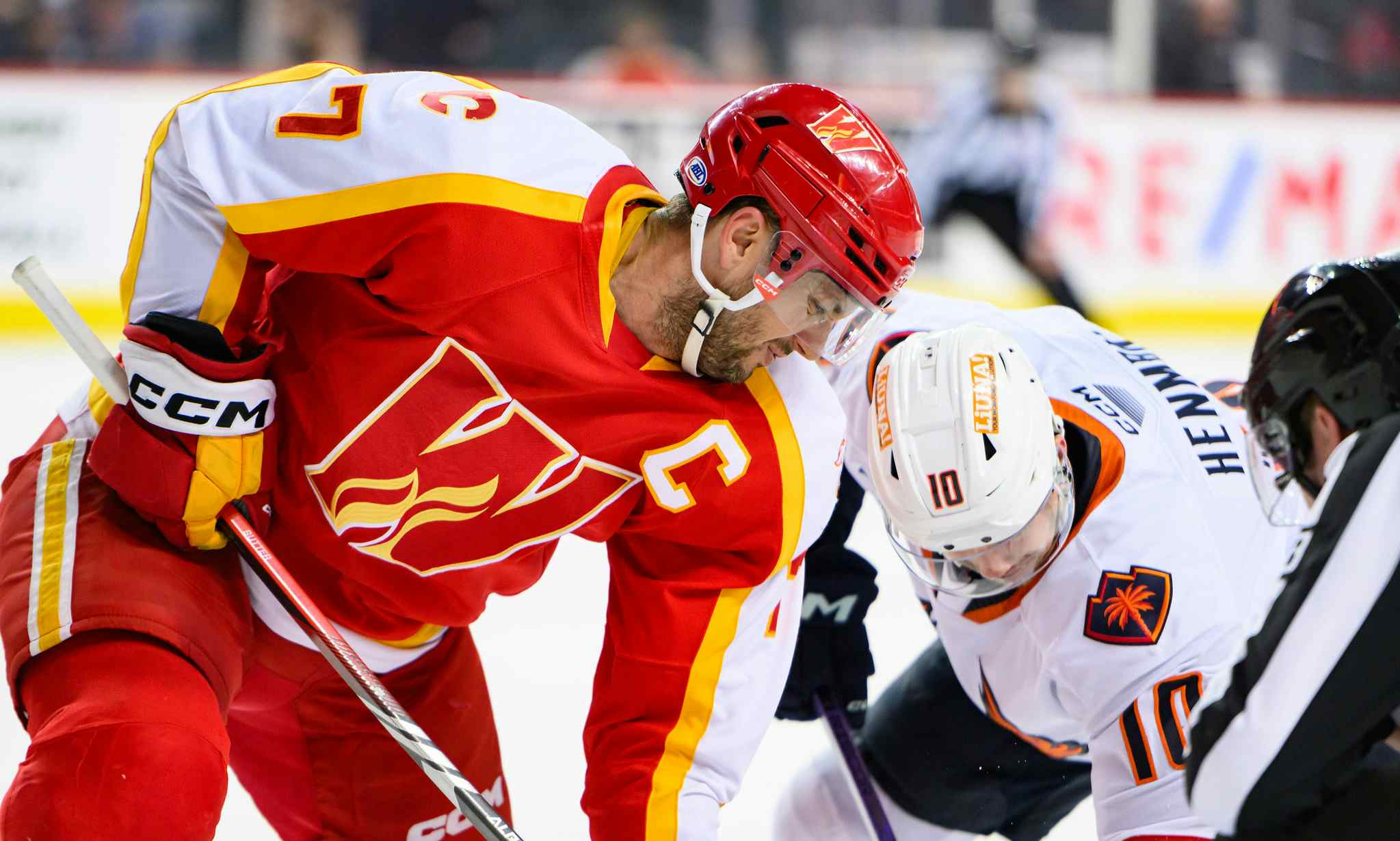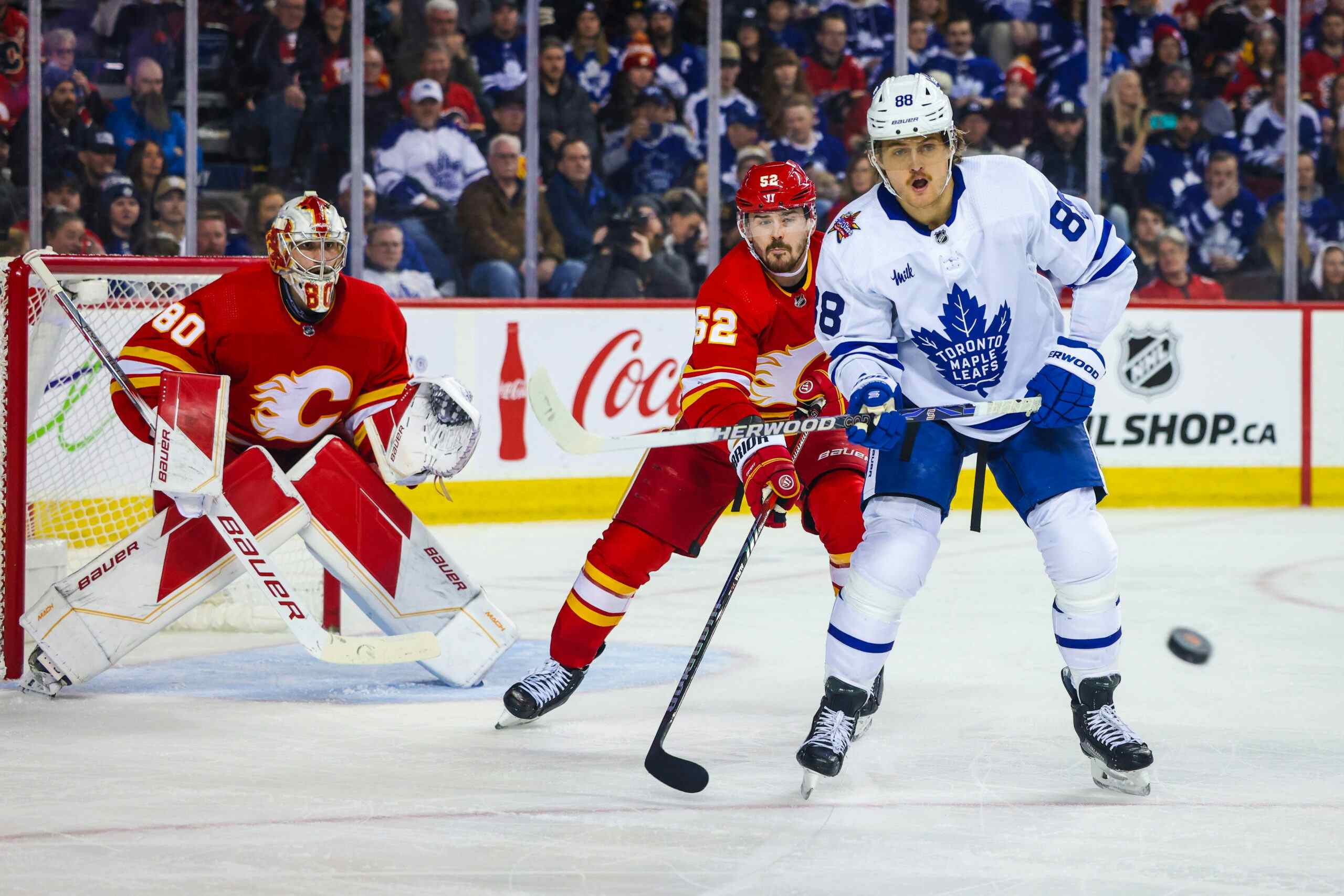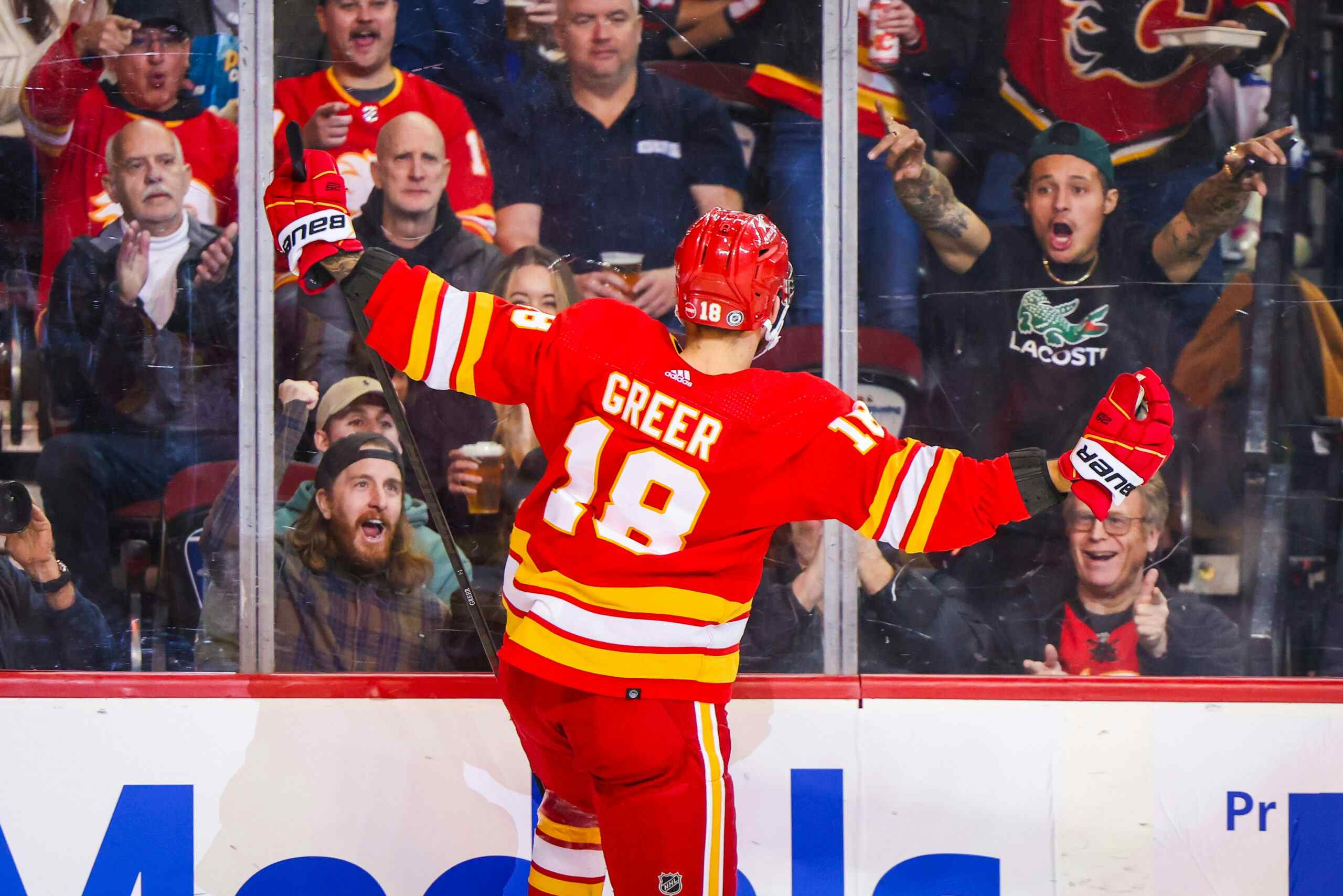Canadiens 6, Flames 2 post-game embers: RIP
By Ari Yanover
8 years agoAfter two periods, this was looking like another game in which the Flames deserved a better fate. But considering how the entire team collectively gave up in the third period, that simply isn’t true.
I’d say it’s too bad, but it’s probably better for the team to crash and burn so there aren’t any illusions about just who they really are.
So this is why the Flames held Joni Ortio hostage in the pressbox
Through the first six games of the season, the Flames stubbornly carried three goaltenders, convinced that one of Jonas Hiller or Karri Ramo would stand out and claim the starter’s role. From there Joni Ortio, the tentative hope for the future, would take the backup position, growing and learning until he started getting more starts.
Yeah, that hasn’t gone to plan at all. The Flames have the worst goaltending in the league to start this season, and nobody is standing out positively.
All three goalies have had their moments of excellence, but they pretty much immediately get lost in the myriad of horrific goals against. It’s not like it’s all on them, but when you see something like Montreal’s first goal go in… that one is.
Ortio gave up six goals on 31 shots. You have to wonder where the Flames’ faith in him came from. And it’s entirely possible this is just one bad game, but the early returns really aren’t looking good.
That said, don’t trade for a goalie
We’re pretty much already at the point of the season where the Flames have to lie in the bed they made.
And, quite frankly, there’s no rhyme or reason for the goaltending to be this bad. This is a team that was league average when Hiller and Ramo split starts last season. It’s entirely possible they dig their way out of this, and the bounces start going for them rather than against them.
That goes for the whole team, really – literally everything that can go wrong against them is. Just as their success last season wasn’t sustainable, neither are their failures this season.
That’s why you don’t focus on spending assets for a fix in net. What do you do if you trade for someone, hoping to get this season’s Devan Dubnyk, and it doesn’t work out because the rest of the team is still just as awful, and his save percentage then plummets? You shouldn’t be willing to risk that when your team’s play pretty much eliminated themselves not even a month into the season.
There’s no quick fix to be found here. Don’t try to force one. Especially because you’re going to lose if you’re coming from a position of desperation, which – if the Flames do try to acquire another goalie – they will be.
We need to talk about Kris Russell
Kris Russell played 20:29, behind only Mark Giordano and T.J. Brodie in ice time. He was also on the ice for Montreal’s first three even strength goals against, aka the goals scored when the Flames were actually outplaying the Habs and looked to have a chance. He started in the offensive zone 69.23% of the time at even strength, and had the Flames’ worst corsi with 36.36%.
For emphasis: Russell had the sixth most beneficial zone starts on the team, and he had the worst possession rates. His defence seemed to consist more of screening his goalie and letting passes through than anything else.
You may wonder why I’m not roasting Dennis Wideman alongside him. And it’s true, Wideman was on the ice for those very same goals against, and we’ve had games upon games upon games of data to prove that the two of them simply are not a good pairing (and yet they’re one that Bob Hartley keeps going back to, regardless).
This is why I’m not harping on Wideman: his even strength corsi was 52.38%. And sure, there are good arguments to make for as to why he made out better: he had better offensive zone starts, and he played less (particularly when the Flames simply gave up on the game).
Let’s go further into that.
Russell and Wideman had 18 shifts apiece through two. So they were pretty much side-by-side, defending poorly as an item.
For some reason, in the third period, Hartley decided it was Wideman who needed benching, and not Russell. Russell played 12 shifts in the third to Wideman’s seven. Russell had played 2:13 on the powerplay to Wideman’s 1:45 – and we should note that if Wideman is anything in particular, he is a powerplay specialist.
What was it Russell did that Wideman didn’t that allowed him to escape the coach’s ire? Both were terrible defensively, as they are wont to be (and have been wont to be for a considerable amount of time now). Both were responsible for goals against when the Flames were actually controlling the game.
One more thing, and asterisk due to small sample size as you may: at even strength, away from Wideman, Russell had 12.50% CF. Wideman, away from Russell, had 57.14%.
Hell, even Dougie Hamilton – who actually finished with a few more seconds played than Wideman, taking over some of those third period shifts – was 51.72% ES CF away from Russell. With 3:46 spent with him, he was 0.00% ES CF.
Let’s find a positive here
Before things went completely off the rails, and the Flames actually had a chance at this game – if only one of their many, many early, high quality chances actually went in (I feel for Mason Raymond at this point) – Giordano and Brodie were absolutely. Killing. It. With the two of them leading the Flames in ice time, halfway through the game, they had allowed just one even strength corsi attempt against them.
One. Over 30 minutes. Roughly 10-12 of which, they played at even strength. They were registering ES CFs of 94% (Brodie) and 95% (Giordano).
Of course, that couldn’t last – by the time the second period ended, there had been, like, three or four even strength events against them – but even with the meltdown in the third period (which they were partly responsible for), they were still very easily the best on the Flames.
In a game like this, take the positives where you can get them. And this is a pretty big positive to take. Why? Because it shows they still have it – and gives hope that they’ll still have it by the time the rest of their team figures out what they’re doing, whether that’s months or years from now.
Johnny still B. Goode
That was terrible and I apologize.
Mostly, though, I just wanted to highlight this comment by RickT, made following the Rangers game, on Johnny Gaudreau (comment #13, appropriately enough):
It’s strange to say, and even harder to properly communicate – but those assists of Johnny G. Hockey Esq. are basically goals.
They are such sublime passes, that lead directly to goals. I feel like Nemisz could be on Johnny’s line and score at a great pace, because Gaudreau is just setting them up on a silver platter.
I understand that goals are nice and you see the direct result. But, in this case, they are Johnny’s goals – he’s just not the one actually putting the puck in the net.
That’s basically the feeling I got on Josh Jooris’ goal. Not that it was a sublime pass that created it, but that the goal was the result of Gaudreau doing the immediate work (with shoutout to Sam Bennett for his assist on the play, too).
Gaudreau has one goal and 11 assists in 11 games. What’s the opposite of the Cy Young Award? Because Gaudreau is the early favourite to win it. He’s creating his team’s offence. Last night, he led the way with four high danger scoring chances – which were the only kind of individual corsi attempts he even had.
Gaudreau is currently tied for top six in NHL scoring, and 75% of it is coming at even strength. Like Giordano and Brodie, he’s well on his way to emphasizing he’s the real deal.
Byron sure showed Brad
Brad Treliving has had a number of blunders throughout his general managing tenure to date – just as literally every single GM ever has – but it really came back to bite him last night.
It made no sense for the Flames to waive Paul Byron. They weren’t at the roster limit. They didn’t need to offer him up for free. But they did, and thanks to that, the Flames lost one of their most versatile players – and he’s someone they could sure use right now.
Here’s an example. Joe Colborne and Sean Monahan rise each other’s game a little, but not enough to really make a compelling case to keep the two together. Byron played about 130 even strength minutes with Monahan last season, though, and together, they brought one another over 50% ES CF (and were at 50% ES GF, if you’re more concerned about goals than corsis).
In two games this year, Byron has two points and no penalty minutes. In nine games this year, Brandon Bollig has no points and 35 penalty minutes. Throughout his career, Bollig has 19 points. Byron scored 19 points last season, and that was with him not scoring as often as he could have.
Byron is an extremely versatile player that could fit literally anywhere within the lineup – either wing, down the middle, on any line – and contribute. He was an excellent penalty killer for that matter, too.
People like to joke about his inability to score on breakaways, but he did, on occasion. And even if you want to forget that part to suit the meme: just remember that the meme exists for a reason to begin with. And that reason is that he was good enough to consistently get those breakaways.
His goal was a statement on the night, and I’m happy for him.
Recent articles from Ari Yanover





